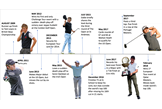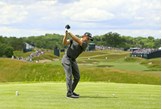Big Interview: Eddie Pepperell
Published: Last updated:
Eddie Pepperell is a European Tour winner. It’s still fresh, having become a champion just a day ago, but it’s been a long time coming for the Englishman.
Eddie Pepperell is one of golf’s most compelling characters. Penniless at 21, his rags to riches tale has been documented in his blog, and taken him from the top of the Open leaderboard to the depths of Q-School. Fresh from surviving the yips, he’s now trying to make up for lost time, starting with a European Tour victory and a place in the Ryder Cup.
Two issues ago we published our latest big interview with 27-year-old Pepperell, where we talked to him about hitting rock bottom, starting his blog, and why he predicted a win was just around the corner.
Eddie Pepperell likens his golf career to the economy. He has gone through the recession – missing 16 cuts in 21starts–and is now on the up, posting six top 10s in his last nine starts (this was written just after the Turkish Airlines Open last year. He since has gone T38-T45-MC-MC-MC-T44-1st). He’s had to suffer to get there, and even penned a blog post admitting that it felt like his world was “crumbling down around him” after the 2016 Portugal Masters.
Ironically, he is now sitting just a sand wedge away from the hotel room where he wept uncontrollably. The Englishman can still recall the moment he doubled the last to leave himself outside the cutline and without his European Tour card for last season.
Not since playing on the Challenge Tour five years ago had his future appeared so uncertain. Back then, things got so bad that Pepperell was broke and needed to win the Cordon Golf Open to pay his hotel bill. He did so in a sudden-death play-off, and then launched his blog soon after. He has used it ever since to offer an insight into his emotional torment and the loneliness of life on Tour.
“Golf has shown me its darker, more insidious side,” he wrote last year. “Logically this game doesn’t make much sense.”
If it did, the formbook would have relegated him to the Challenge Tour without a second chance. As it was, the 26-year-old finished fifth at Q-School last year to reclaim his European Tour card, and ended this season nearly €1 million richer. He did so after changing clubs, caddies and coaches, and battling back from the driver yips. It all makes for one hell of a story…
How hard was it to gather your emotions and try to win back your Tour card just three weeks after losing it?
It was tough and the days were really long. The churn of getting out of bed and playing 18 holes for six days straight was exhausting. My overwhelming emotion was one of enormous relief; probably the most I’ve ever felt coming off a golf course. Everyone who is at Q-School is there for a reason, but I knew I was playing well enough to win it, and I came close. I said in an interview ahead of the Portugal Masters (in 2016) that whatever happened, it wouldn’t define my career. And I felt the same going to Q-School.
Is it true that you ended up playing with an infected ankle?
Yeah, I kicked a club and it tangled in my feet, the head hit my ankle and cut it open. It was quite an innocuous thing, but I woke up the next day and I was struggling to walk. I had it strapped, but it got cut open again and then it got infected. It was a bit bizarre, and probably couldn’t have happened at a worst time.
What do you attribute to your loss of form in 2016?
I know I make the right decisions when I think, and last year (2016) I stopped thinking and made one bad decision in hindsight. That was changing coaches. This year, I’ve got back to making very good decisions. From April onwards, I made a number of changes – caddie, equipment and house. I ended up getting a putting green installed inside soon afterwards, which has made a big difference to my putting.
What was the motivation behind leaving TaylorMade?
The reason I came out of my contract was because I was really struggling off the tee. Looking back now, I was just lazy and didn’t understand how the product I was playing with at the time wasn’t helping me. It’s great for some guys, but not for me. It suited a modern player, but I haven’t got a modern swing. I have a tendency to hit down on a driver, so actually I wanted a lot more backspin with my driver setup.
The guy that picked up on it was a Titleist fitter called Liam. I was hitting it low left and he was saying if you don’t want to see that shot, you need to get the spin rates up. It was as simple as that. I ended upcoming away with a new Titleist driver and ball. I will be forever grateful to the big, lanky Scotsman.
How bad did things get?
It was awful; I was going to sleep dreading tee shots I was going to face the next day. It was a mental thing. It didn’t begin as one; it was a technical issue but festered and became a mental thing. There are still some times when I don’t feel comfortable with certain tee shots. I’m slowly building my confidence with the driver, but I’ve also got a super-strong 3-wood. It’s a 13.2° Callaway and the ball speed is as fast with that as it is with my driver. When I’m not comfortable, I pull out the 3-wood. I feel like I’ve rebuilt my game by being proactive and finding the right solutions.

Did you ever look to other players for inspiration?
I don’t look at individuals, I just look at the nature of time. The year before last, I learned a lot about economics and how everything works in cycles. The way I saw my season last year was that I’d had a five-year progression. If you think of it from a market perspective, for five years Eddie Pepperell had been bringing back positive gains. He’d been doing well every year, but a recession was due unfortunately and it came. My job was to make sure it didn’t become a depression, and I did that.
Were you ever concerned about how long it would take to get your game back?
No, I wasn’t. I have confidence in my ability and myself as a character. I knew I had to maintain perspective. I had a bad nine-month spell; whereas other people endure a bad three-year spell, which is awful. Ironically, my best blogs were written when I was struggling with my game. I was very retrospective and drew on my raw feelings. I think a lot of people – golfers and non-golfers – are able to connect more to the raw sh****ness of life, rather than the ups.
What motivated to you to start writing your blog?
An old coach suggested that I should copy Luke Donald and start writing all my thoughts down. I decided to go one step further by starting a blog. The funny thing is I hated English at school and only started reading books when I was 19. Grammatically, my writing is probably a disaster, but I haven’t amended or changed any of them. The five years since I started writing shows the progression I’ve made as a person. If you read every one from start to finish, you probably have a good insight into me, as an individual.
Has loneliness been the biggest challenge you’ve faced on tour?
It has changed a lot. The first year on the Challenge Tour I really enjoyed and knew a few guys, so the transition was quite easy. But my first year on the European Tour was probably the most difficult in terms of the loneliness. I didn’t really know anybody, had few friends and I was a very small fish in a very large pond. It was difficult.
Relying on room service isn’t easy and living like that can get on top of you, but the best way to overcome it is to get better at golf. It can be a difficult challenge and lifestyle – no matter how good you are – but if you are brilliant at it and make a lot of money on the course it makes the rest of your life a lot more stress-free. I realised that and thought the best way to overcome it is not to feel sorry for myself or bemoan the lifestyle. It was just to get better at golf and challenge to win events. That’s what I’ve done.
How important was finishing tied 16th at the US Open in proving to yourself that you were getting back to your best?
The whole week at the US Open was brilliant, but stressful. I remember coming off the course on the Friday having made the cut and saying there’s a reason the US Open has the biggest prize fund in history. It was such a tough test and I felt massively proud coming off the course on Friday knowing I’d made the cut. The Sunday was nice because I ended up beating Sergio, who I was playing with, which was a big thing for me.

Knowing the pressure Erin Hills puts on your driving, was it almost the perfect course to see how far you had come?
I hit two good drives on the last two holes of the tournament, when I most needed to. They weren’t easy drives, so that was a big turning point. Though I was 16th, it felt like a top five. Theoretically, I was the second-placed European and in any other event in Europe, that is a top five. That level of performance was better than a 16th and it was huge for my confidence.
Just before the US Open, you also kick-started a trend of players splitting with their caddies. What was the reasoning behind that decision?
Things got stale and there was no spark. I felt like I needed to change and I wanted my behaviour to change. The only way to do that was to change personnel. I know that I act differently around strangers compared to friends. Jamie [Herbert] is a good friend and we had been together for four years.
At that point, we were probably one of the longest serving relationships on the tour. Maybe not Arsene Wenger level, but we were up there. It’s a good thing I made the change because I’ve had three or four different experiences with various caddies since then, and I feel like I’ve learned what I do and don’t want. The guy I’ve got at the moment – Mick Doran – is very experienced. I want him to be there for next season. He’s a top caddie.
Have you set yourself any targets for 2018?
I’ve been doing the same thing with my game for the last six months and I need to bleed that out. I need to see how far I can go. I feel like I’ve worked things out with my coach [Mike Walker] and found a good thing. That’s something I haven’t managed to do in my career as a professional, so I’m excited for 2018.
I’m seeing a lot of consistency in my scoring and I know if I can continue that pattern, there will be some good results and I know, when I have that good week, I will post a winning total. I believe, on my day, I can compete with anybody. Over four days is a different thing and that’s what I’m trying to get better at.
Have you dared to dream about making the Ryder Cup team?
It’s a long way away; I haven’t even looked at the list. I’ve played the French Open at Le National for the last five years, and it’s a hell of a golf course. I think that, potentially, it could be the greatest Ryder Cup ever. In regards to me playing in it, I need to do that six-month spell I described by winning some big events.
Because we did this interview in 2017, we asked Eddie how he felt about still waiting for the win. Given his belief in his game, perhaps the only surprising this about his victory is that it took this long. This is what he said…
Do you feel pressure having not won on the European Tour yet?
Not at all. I’m not out here to win once; I want to win dozens of times. Once you win once and create a winning game, the mentality shifts and you can win four times in one season. That can happen and I believe that it can happen to me.
And it did. Eddie won his first European Tour event on Feb 25 in Doha at the Qatar Masters, beating compatriot Oli Fisher by a single shot. Read more…



